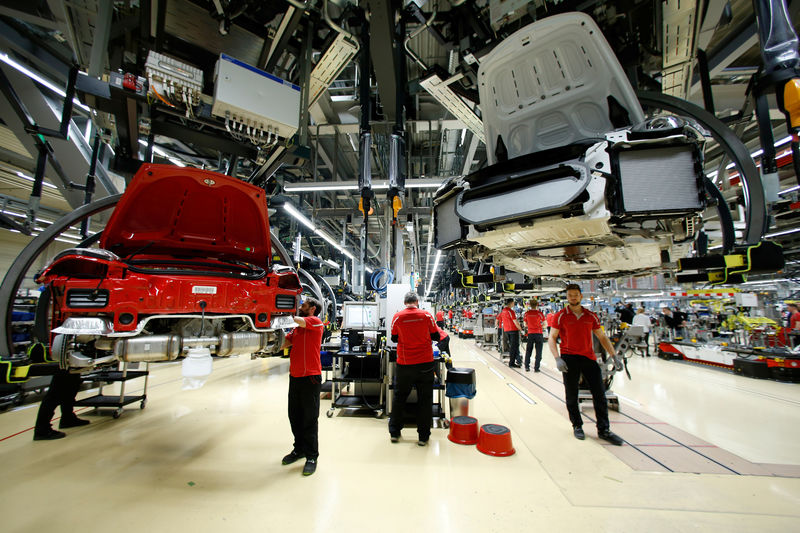By Michael Nienaber
BERLIN (Reuters) - German industrial orders rose less than expected in March following two months of steep declines, data showed on Tuesday, bringing little relief for Europe's largest economy which is facing a sharp slowdown in growth and dwindling tax revenues.
German exporters have been hit by weaker demand from abroad, trade tensions triggered by U.S. President Donald Trump's "America First" policies and business uncertainty caused by Brexit.
Domestic factors include problems in the car industry where companies are struggling to adjust to stricter emission rules.
Contracts for 'Made in Germany' goods were up 0.6 percent, figures from the Federal Statistics Office showed, undershooting a consensus forecast of 1.5 percent.
The rise in March was mainly due to bulk orders, the economy ministry said. "The industrial orders data suggests that activity in manufacturing will remain subdued in the coming months," it added.
Excluding bulk orders, industrial orders fell by 1.9 percent in March, the ministry said.
"Together with the weak business sentiment indicators, this is another sign that the industrial sector is in a deep recession," Ralph Solveen from Commerzbank (DE:CBKG) said.
For the first quarter as a whole, industrial orders fell by 4.1 percent on the quarter with the drop mainly driven by weaker demand from abroad, the economy ministry said.
The industrial orders reading for February was revised slightly up to a fall of 4.0 percent from a previously reported drop of 4.2 percent. In January, orders fell by 2.1 percent.
SLASHED FORECAST
The German government has slashed its 2019 growth forecast to 0.5 percent. This would mark a sharp slowdown after expansion rates of 2.2 percent in 2017 and 1.4 percent in 2018.
The difficult trade environment means that domestic demand is likely to be the main growth driver this year, helped by record-high employment, rising real wages and low borrowing costs. Higher state spending and construction are expected to give the economy an additional push.
The slowdown is reducing tax receipts and with it the budget surplus which makes it more difficult for Finance Minister Olaf Scholz to inject additional fiscal stimulus into the economy as all parties in conservative Chancellor Angela Merkel's coalition government agreed to refrain from issuing new debt and hiking taxes.
Scholz, a Social Democrat, will present updated tax revenue estimates on Thursday. The figures are likely to show that Berlin will have less fiscal room to hike state spending from 2019 to 2023.
"Politicians have to become braver," Joachim Lang, the managing director of Germany's BDI industry association, said. He called on the government to reduce taxes for companies and increase incentives to support corporate research and development.
The German cabinet is expected to pass a draft law next week which aims to support corporate research and development with new incentives worth 1.25 billion euros ($1.4 billion) annually from 2020.
Companies doing basic research or industrial development can apply for a bonus of up to 500,000 euros per year, with the incentives not limited to small- and medium-sized firms.
"This is the right step... but the sum has to become bigger so that companies can use this new instrument efficiently," BDI's Lang said.
